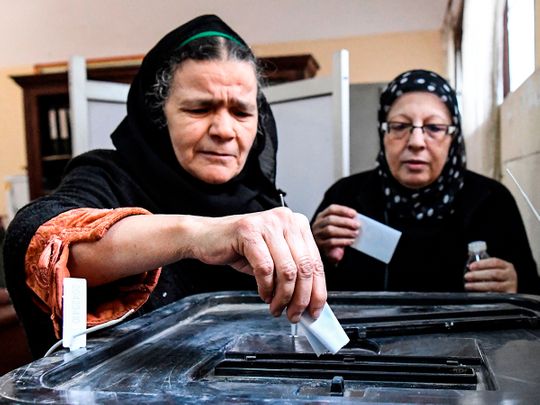
Egypt’s three-day referendum on their nation’s proposed amendments to the 2014 constitution began on Saturday. The turnout and the celebratory atmosphere surprised local commentators and forced the National Election Authority to rush more judges and assistants to cope with “huge” crowds at certain polling stations.
The results will not be known until this week, but judging by the large crowds seen rallying in favour in various governorates I suspect the changes will pass. However when reading reports by the foreign press, you would imagine the occasion was one of doom and gloom. On the contrary, it was a festive family occasion with music and spontaneous dancing.
For instance, the Guardian chose to feature a column by someone “living in exile” in the UK headed “Egypt referendum: No one believes this vote will be fair but we won’t be silenced” and illustrated with a woman carrying a Muslim Brotherhood logo. “In Egypt Referendum, Only the Turnout seems in Doubt” is a headline in the New York Times. Others falsely write off the referendum as a government ploy solely meant to extend the president’s term of office en route to dictatorship. Some media indoctrinated doubters on social media confronted with photographs and videos of enthusiastic crowds making victory signs wrote them off as photo-shopped; never mind that local networks aired live feeds throughout the day.
These sour disbelieving attitudes are reminiscent of those displayed in June-July 2013 when over 30 million Egyptians flooded the streets of Cairo and other cities demanding the failed Brotherhood president step down and when the army responded to those demands, the US, the UK and Europe punished Egypt for what they described as a coup.
Their double standards are glaring. The enforced removal of Ukraine’s president in 2014 was backed by the US and the EU which termed it not a coup but a “people’s revolution”. Moreover, the Trump White House has held a mix of carrots and threats to Venezuelan generals to forcibly unseat the elected leader President Nicolas Maduro while unilaterally appointing his replacement. Likewise the revolutions in Algeria and Sudan are being hailed.
The foreign mainstream media either does not understand the mood in Egypt or abides by an agenda set by the nation’s adversaries. The fact is that the House of Representatives voted overwhelmingly to support constitutional changes which encompass a new Upper House, the appointment of a vice-president, an allotment of 25 per cent of parliamentary seats for women as well as “an appropriate representation” of Coptic Christians, youth, farmers and workers. The military is tasked with “safeguarding the constitution” and the preservation of a civil state.
This is the article focused upon by media detractors. “The President of the Republic shall be elected for six (instead of four) years by the end of his predecessor’s term, though he/she cannot remain in office for more than two consecutive terms”. The message disseminated by western networks and newspapers is scathing accusing this term extension as being undemocratic. But wait a minute!
Israel’s Prime Minister Benjamin Netanyahu has just been re-elected for a fifth consecutive term and hardly a negative peep out of the usual scribblers who laughably laud the militarised Jewish state as the sole democracy in the Middle East.
Egyptians are among the most misunderstood people on the planet. Most I’ve spoken with are happy for their president to have more time to complete his vast array of mega projects — 12 new cities to cater for an increasing population of 100 million, three new airports, excavations of oil and gas, desalination plants, resurrection of industries such as cotton, hundreds of new factories, free zones, free furnished apartments for former slum dwellers.
On his watch, the economy has been re-energised. Growth as soared to 5.5 per cent, the highest in 10 years. The tourism sector is the fastest growing in North Africa with a 50 per cent increase in revenues last year. Foreign reserves are the highest recorded. Unemployment has been reduced from 13.3 per cent in 2014 to 8.4 per cent at the end of last year. Inflation is being reined in. The IMF, the World Bank and ratings agencies have all given Egypt’s economic reforms the thumbs up. Why shouldn’t his term be extended when he’s doing such a great job!
Most importantly he has delivered on security and after so many years of violence and disruption to lives that is what the majority of Egyptians appreciate. Certainly yellow-vest type protests whereby shops and ATMs have been looted or torched or sit-ins currently plaguing central London are discouraged and thank goodness for that in a nation that recently emerged from intensive care.
Last week the Secretary-General of Egypt’s Supreme Council for Media Ahmad Salim rightly noted that foreign media referendum coverage is biased and irregular. I can only appeal to my media colleagues to break free from ingrained perceptions and biases long enough to see all the good that is being achieved to benefit lives and future generations. Quit giving platforms to Brotherhood sympathisers or embittered dissidents and talk to ordinary Egyptians if truth has any value at all.
Linda S. Heard is an award-winning British political columnist and guest television commentator with a focus on the Middle East.









